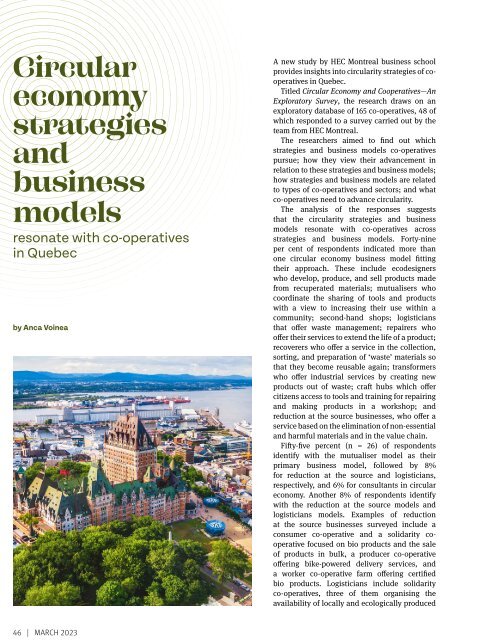Co-op News March 2023
The March edition of Co-op News: connecting, challenging and championing the global co-operative movement. This issue includes a special news report on the response by co-ops to the earthquake disasters in Syria and Turkey. And we look at US Black History Month, International Women's Day and the UK Fairtrade Fortnight - including our shopping guide for a range of fabulous Fairtrade gifts. Plus reports from the Future Co-ops and UKSCS conferences, as the movement looks to define its role in dealing with the multiple crises facing the world. And there are features on waste picker co-ops in South America, the circular economy in Quebec and and the UN's Sustainable Development agenda.
The March edition of Co-op News: connecting, challenging and championing the global co-operative movement. This issue includes a special news report on the response by co-ops to the earthquake disasters in Syria and Turkey. And we look at US Black History Month, International Women's Day and the UK Fairtrade Fortnight - including our shopping guide for a range of fabulous Fairtrade gifts. Plus reports from the Future Co-ops and UKSCS conferences, as the movement looks to define its role in dealing with the multiple crises facing the world. And there are features on waste picker co-ops in South America, the circular economy in Quebec and and the UN's Sustainable Development agenda.
Create successful ePaper yourself
Turn your PDF publications into a flip-book with our unique Google optimized e-Paper software.
Circular<br />
economy<br />
strategies<br />
and<br />
business<br />
models<br />
resonate with co-<strong>op</strong>eratives<br />
in Quebec<br />
by Anca Voinea<br />
A new study by HEC Montreal business school<br />
provides insights into circularity strategies of co<strong>op</strong>eratives<br />
in Quebec.<br />
Titled Circular Economy and <strong>Co</strong><strong>op</strong>eratives—An<br />
Exploratory Survey, the research draws on an<br />
exploratory database of 165 co-<strong>op</strong>eratives, 48 of<br />
which responded to a survey carried out by the<br />
team from HEC Montreal.<br />
The researchers aimed to find out which<br />
strategies and business models co-<strong>op</strong>eratives<br />
pursue; how they view their advancement in<br />
relation to these strategies and business models;<br />
how strategies and business models are related<br />
to types of co-<strong>op</strong>eratives and sectors; and what<br />
co-<strong>op</strong>eratives need to advance circularity.<br />
The analysis of the responses suggests<br />
that the circularity strategies and business<br />
models resonate with co-<strong>op</strong>eratives across<br />
strategies and business models. Forty-nine<br />
per cent of respondents indicated more than<br />
one circular economy business model fitting<br />
their approach. These include ecodesigners<br />
who devel<strong>op</strong>, produce, and sell products made<br />
from recuperated materials; mutualisers who<br />
coordinate the sharing of tools and products<br />
with a view to increasing their use within a<br />
community; second-hand sh<strong>op</strong>s; logisticians<br />
that offer waste management; repairers who<br />
offer their services to extend the life of a product;<br />
recoverers who offer a service in the collection,<br />
sorting, and preparation of ‘waste’ materials so<br />
that they become reusable again; transformers<br />
who offer industrial services by creating new<br />
products out of waste; craft hubs which offer<br />
citizens access to tools and training for repairing<br />
and making products in a worksh<strong>op</strong>; and<br />
reduction at the source businesses, who offer a<br />
service based on the elimination of non-essential<br />
and harmful materials and in the value chain.<br />
Fifty-five percent (n = 26) of respondents<br />
identify with the mutualiser model as their<br />
primary business model, followed by 8%<br />
for reduction at the source and logisticians,<br />
respectively, and 6% for consultants in circular<br />
economy. Another 8% of respondents identify<br />
with the reduction at the source models and<br />
logisticians models. Examples of reduction<br />
at the source businesses surveyed include a<br />
consumer co-<strong>op</strong>erative and a solidarity co<strong>op</strong>erative<br />
focused on bio products and the sale<br />
of products in bulk, a producer co-<strong>op</strong>erative<br />
offering bike-powered delivery services, and<br />
a worker co-<strong>op</strong>erative farm offering certified<br />
bio products. Logisticians include solidarity<br />
co-<strong>op</strong>eratives, three of them organising the<br />
availability of locally and ecologically produced<br />
46 | MARCH <strong>2023</strong>

















